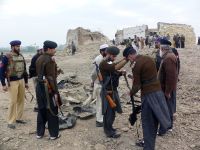By Nida Ramahi
A leading British political analyst and expert on the Middle East politics has said that the Palestinian President Yasser Arafat, and the Arabs, have little choice regarding the conflict with Israel, as long as US hegemony is there.
“The pressure on Arafat [at the Sharm el-Sheikh summit] would’ve been that if you want a deal at all, if you want peace, if you want your state, if you want it with the maximum territory available, with maximum success in its establishment, and with international recognition, then you have to go down the path of the American mediated peace process,” said Rosemary Holice, head of ME program at the Royal Institute of Middle-East Affairs, London, in a telephone interview with Albawaba.com.
Regarding the upcoming Arab summit and the results the Palestinians can expect, the situation is identical, according to Holice.
“I think Arab leaders are in a very awkward situation, and I think Arafat is not the only one under pressure….in the sense that if you want a peace process, if you want a peaceful resolution to the Arab-Israeli conflict, then you can’t resist the American formula and there is nobody else who can deliver the Israelis,” she added.
After a day and a half of frenzied talks between US President Bill Clinton and Ehud Barak and Arafat, an agreement was reached to end three weeks of bloodshed. Both the Israelis and Palestinians signed a binding statement that calls for three things: First, the immediate end to the current wave of violence which has killed more than 110 people, mostly Palestinians, second, a fact finding mission to probe the cause of violence and third, a meeting between Arafat and Barak in two weeks time to discuss the revival of the peace process. Although this binding statement was finally reached between both leaders, many argued that it wouldn’t last and that the uprising would continue believing that Arafat was pressured into attending the summit in the first place. Others said that this summit was meant to water down the Arab summit.
Q: Can you give us your general assessment of the situation?
A: I think Sharm Al-Sheikh achieved the most that it could’ve achieved which is a pulling back from the flash points, especially the points outside Arab towns in the West Bank and Gaza where you’ve got the Israeli tanks and where you’ve got the youths confronting Israeli forces and where the most deaths are potentially likely to occur.
Q: It seemed that Ehud Barak was satisfied with the results of the Summit
A: I think the way the statement was phrased at the end of the summit gave both sides the excuse to say they had conceded to the wishes of the Americans and the international community to address the emergency situation, without saying that they were doing it to establish as a new dialogue with each other. In other words, they save face without agreeing to anything and they have an excuse to blame the other side if it falls apart.
Q: There are many who have said that Arafat was pressured to attend the summit at Sharm el-Sheikh and that he was pressured into signing the binding statement.
A: There is no doubt that Arafat was under pressure to go along with this, I think what saves it a little bit for Chairman Arafat is that he can point to the fact that the UN was involved, the US President was involved, and he finally got acknowledgement from a wider international community. Maybe he now has a say in how we move forward from here because prior to that, he was very much isolated, tucked away with just the Americans and the Israelis and so the amount of pressure that could be exerted on him was that much higher.
Q: What kind of pressure do you think he was under?
A: The pressure on Arafat would’ve been that if you want a deal at all, if you want peace, if you want your state, if you want it with maximum territory available, with maximum success in its establishment and with international recognition, then you have to go down the path of the American mediated peace process to which there is some possibility of the Israelis agreeing. Any other formula and you lose the Israelis so what’s the point, you don’t get a deal; period. The US Oslo process is the only game in town, Arafat doesn’t have any choices and if he is to achieve his overall ambitions for the Palestinians, his best chance is to go with this process and go with the Americans and do something that the Israelis can agree to. I’m not saying that they promised something specific this time at all, they are making it clear to him that he has little alternative.
Q: Ehud Barak is saying, at least on public TV, that he is planning to form a coalition government with Ariel Sharon, doesn’t this make the possibility of a final settlement and a Palestinian State almost non-existent?
A: I think in the immediate future, if the cease fire element of Sharm Al-Sheikh sticks for some days, then the next question will be what sort of government the Israelis form? And if it is a coalition between Barak and Sharon, I don’t see how in the world the Palestinians can get back to talking peace, because Sharon is on record as saying that he will have the Israelis pull back from the things that they were ready to offer at Camp David. And what was offered at Camp David was not enough. With Ariel Sharon, the conditions can get smaller and far less attractive.
There is a theory that Barak won’t go ahead with forming a coalition with Sharon but is dangling it as a possibility to put pressure on Arafat. The same theory says that Arafat released Hamas prisoners and re-arrested them as a message to Barak. Both sides were sending each other signals that they had ammunition, that they can put pressure on each other, and this could continue.
Q: There are some who say that Barak doesn’t necessarily want a final settlement to be reached during Clinton Administration’s term, what do you say to this?
A: There are theories that neither the Israelis, nor the Palestinians, want to save something for the incoming president. But I think Barak ran after a series of options which haven’t met with much success, in terms of domestic political standings, in terms of his coalition building, and in terms of the peace process, since he came into office. So, he has to do something in order to save his political skin.
Q: But it’s been said that there is not enough support for Ehud Barak in the Knesset which will be reconvening soon. Unless Barak forms a coalition government he will not stay. What do you think about?
A: He shares the desire with Ariel Sharon to keep BB Netanyahu on the sidelines for the time being, there is also that element.
Q: But that would mean that ultimately the peace process could be dead?
A: The peace process is certainly hostage to Israeli domestic politics at this moment.
Q: How will the international community view the agreement of the binding statement that was concluded at Sharm Al-Sheikh, considering that for the first time, they get a real picture of the type of things Palestinians go through?
A: I think people are confused in the international community. You’re quite right that they should have learned from this, the exact circumstances in which the Palestinians live, they were shocked by what had happened. But I really don’t think many people know that Israelis can close off individual Arab towns. They simply don’t understand that there are Israeli Palestinians, the Palestinians of the West Bank and Gaza, Palestinians in Jordan, in Syria and in Lebanon. It’s all too complicated for them. And when you come to the diplomats and the governments in the International community, they have known all along the circumstances of the Palestinians. But they have accepted that the Americans are making some progress. The best thing for the European governments and the EU has been to support the Americans. Now I think they are going to pressure the Americans, to say your method doesn’t work, what do you intend to do to improve it?
The international community could take a more active role in the peace process, especially if a coalition government is formed in Israel. We could have a repeat of what we saw when Benjamin Netanyahu was Prime Minister in Israel. The Europeans were more visible in expressing their concern by using whatever means they could within the European Union to put some kind of pressure on Israel. With the European parliament quibbling over the observance of existing trade agreements, we saw it in the processing of the new trade agreement. It doesn’t amount to anything very strong though. They have been quite fed up that they haven’t been able to have more of a say because they’re expected to pick up the billings at the end of the day. It’s no good looking towards the Europeans to be able to deliver Israel; they can’t. There is no substitute for the US when it comes to actually getting Israel to sign something.
Now as to the violence, I believe that as was demonstrated by the UN resolution, the one that everyone voted for except for the Americans who abstained, the international community demonstrated that they thought there was good reason for the Palestinians to express utter frustration and exasperation with the situation and to rise up. And there was distress at the level of force used by the Israelis to suppress them.
Q: How do you think the agreement at Sharm Al-Sheikh will affect the upcoming Arab Summit?
A: I think Arab leaders are in a very awkward situation, and I think Arafat is not the only one under pressure….in the sense that if you want a peace process, if you want a peaceful resolution to the Arab-Israeli conflict, then you can’t resist the American formula and there is nobody else who can deliver the Israelis. They will be reminded that they need American protection, aid and so on. I assume that they (Arab countries) are in a mood to demonstrate some anger, and this will be about normalization issues, it will be about contacts with Israel. The fact that Egypt and Jordan were at Sharm Al-Sheikh summit will affect the decision to cut diplomatic relations with Israel.
© 2000 Al Bawaba (www.albawaba.com)







